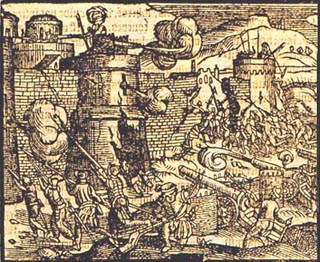The life of a soldier
The Renaissance ushered in a new era in terms of the methods of warfare. Not only were medieval feudal systems breaking down, but technological advancements, such as the development of small firearms and the refinement of cannons, were changing the nature of armed conflict, for better -- and for worse.
The Weapons of War
After Edward III utterly defeated the French at Crecy in 1346, the English long-bow had been a symbol of the English military. However, by the time of Elizabeth's reign, the long-bow had begun to be replaced by firearms. Although many experienced soldiers were reluctant to give up the bows that had been such a source of national pride, Sir Roger Williams, the supposed model for Shakespeare's Fluellen in Henry V, wrote in 1590: "God forbid, we should try our bows with their muskets and calivers. . . 500 musketeers are more serviceable than 1500 bowmen." Certainly, muskets did replace bows, and it was much easier to train musketeers than it was to train bowmen, which could take years. These new soldiers may have been poorly disciplined and poorly trained, but as Falstaff remarks to Prince Hal, they "fill a pit as well as better" (Henry IV, Part One, 4.2.65)
While cannons had already been in use for more than a century when Shakespeare was born, smaller firearms were still being developed. During Queen Mary's time, soldiers who were being trained to use guns found that their weapons often broke after being fired a few times, and that the ignition of the gunpowder could burn them; consequently, many soldiers took to averting their heads while firing, thus missing their targets.
Footnotes
-
Henry V attacks Faleis
The illustration is accompanied by this text in Holinshed:
The frenchmen notwithstandyng thys siege, valiantly defended their walles, and sometimes made issues forth, but small to their gaine, and still the Englishmen with their gunnes and great ordinance made batterie to the walles and bulwarkes
